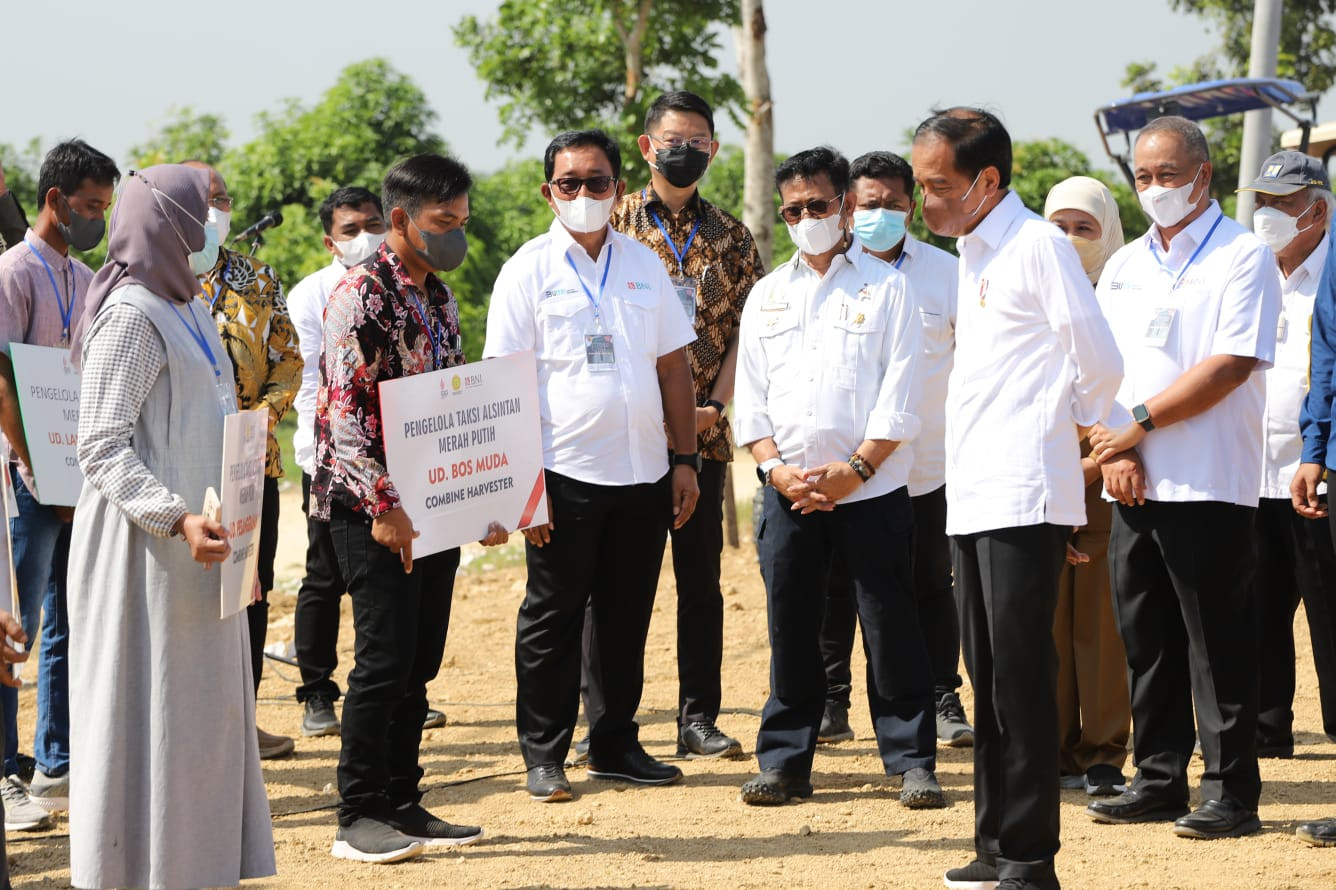Popular Reads
Top Results
Can't find what you're looking for?
View all search resultsPopular Reads
Top Results
Can't find what you're looking for?
View all search resultsBNI supports agriculture and food estate through taxi system for agricultural machinery
Indonesia’s agriculture sector is entering the acceleration phase of its transformation to strengthen productivity and national food stability.
Change text size
Gift Premium Articles
to Anyone
 President Joko “Jokowi” Widodo (fourth right), Agriculture Minister Syahrul Yasin Limpo (sixth right), Public Works and Public Housing Minister Basuki Hadimuljono (right), East Java Governor Khofifah Indar Parawansa (third right), BNI president director Royke Tumilaar (second right), BNI Institutional Relations director Sis Apik Wijayanto (center), Plantations director general Andi Nur Syah Alam (fifth right) and executive director of PT Corin Mulia Gemilang Jemmy Eka Putra (seventh right) in the Taksi Alsintan Program launching ceremony held by BNI and the Agriculture Ministy on Monday in Gresik, East Java. BNI as a development agent is committed to supporting and strengthening the national food and agriculture sector, especially in the agricultural machinery sector service management model with rental or ownership system through the banking credit scheme.
President Joko “Jokowi” Widodo (fourth right), Agriculture Minister Syahrul Yasin Limpo (sixth right), Public Works and Public Housing Minister Basuki Hadimuljono (right), East Java Governor Khofifah Indar Parawansa (third right), BNI president director Royke Tumilaar (second right), BNI Institutional Relations director Sis Apik Wijayanto (center), Plantations director general Andi Nur Syah Alam (fifth right) and executive director of PT Corin Mulia Gemilang Jemmy Eka Putra (seventh right) in the Taksi Alsintan Program launching ceremony held by BNI and the Agriculture Ministy on Monday in Gresik, East Java. BNI as a development agent is committed to supporting and strengthening the national food and agriculture sector, especially in the agricultural machinery sector service management model with rental or ownership system through the banking credit scheme.
I
ndonesia’s agriculture sector is entering the acceleration phase of its transformation to strengthen productivity and national food stability. With this shift, the role of banking institutions as intermediaries has become increasingly crucial, especially in the disbursement of investment loans and providing proper financing solutions for farmers.
The Agriculture Ministry together with PT Bank Negara Indonesia (Persero) Tbk. or BNI (stock code: BBNI) have launched an agricultural machinery taxi (alsintan) program known as Taksi Alsintan. The program follows a service management model with a rental or ownership system using a banking credit scheme. The Agriculture Ministry and BNI have agreed on empowering farmers through capital strengthening, relaxation of financing and assistance The institutions are collaborating through partnerships and fostering data integration to facilitate Indonesia’s micro-credit program (KUR) in Taksi Alsintan.
The collaboration was marked by a Memorandum of Understanding (MoU) signing between Agricultural Infrastructure and Facilities Director General Ali Jamil and BNI institutional relations director Sis Apik Wijayanto. The strategic cooperation was witnessed by President Joko “Jokowi” Widodo, Agriculture Minister Syahrul Yasin Limpo and BNI president director Royke Tumilaar on Monday in Gresik, East Java.
The cooperation scheme in Taksi Alsintan can be processed through KUR with maximum credit of Rp 500 million (US$33,000), an annual interest of 6 percent and additional interest subsidy of 3 percent until Dec. 31. Installment payment periods are also adjusted to harvesting seasons.
President Jokowi was optimistic that the Taksi Alsintan Program would be more feasible with help from banking systems, especially BNI. He shared that more communities and villages would be able to buy more agricultural equipment to increase production within the sector.
“Let’s try this [Taksi Alsintan] program. With the interest that we subsidize, I believe more farmers from [communities], regencies and villages will be able to purchase more equipment and machinery,” he said.
Agriculture Minister Syahrul Yasin Limpo said that the agricultural sector was entering the era of technological transformation where the use of agricultural machinery would increase productivity.
“We appreciate BNI's proactive efforts in improving the performance of the national agricultural sector and national food security. Other than distributing KUR, BNI has also offered productive credit to agricultural machinery suppliers so BNI can create other banking solutions that are more suitable for this primary national sector,” said the minister.
BNI president director Royke Tumilaar added that the agricultural sector’s position had become more strategic this year. Aside from the demand of rising national consumption, there were also disruptions in the food supply chain due to current global conditions. This cooperation, he explained, was BNI’s commitment as an agent of development to supporting and strengthening the national food and agriculture sector
“We thank the government for this opportunity in which BNI can play a larger role in accelerating the agricultural sector’s transformation. We hope this program can increase national food production.” Royke concluded.









